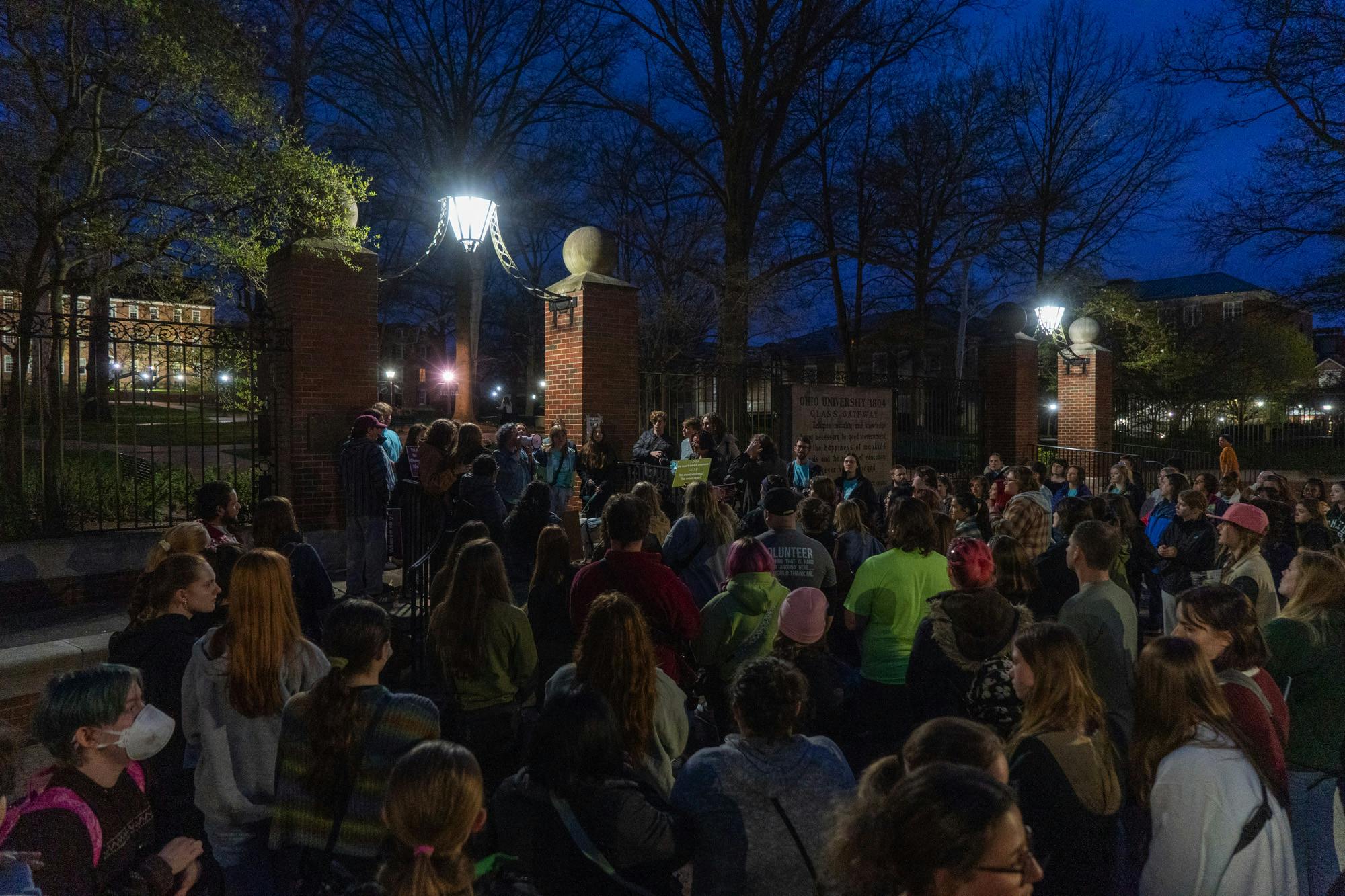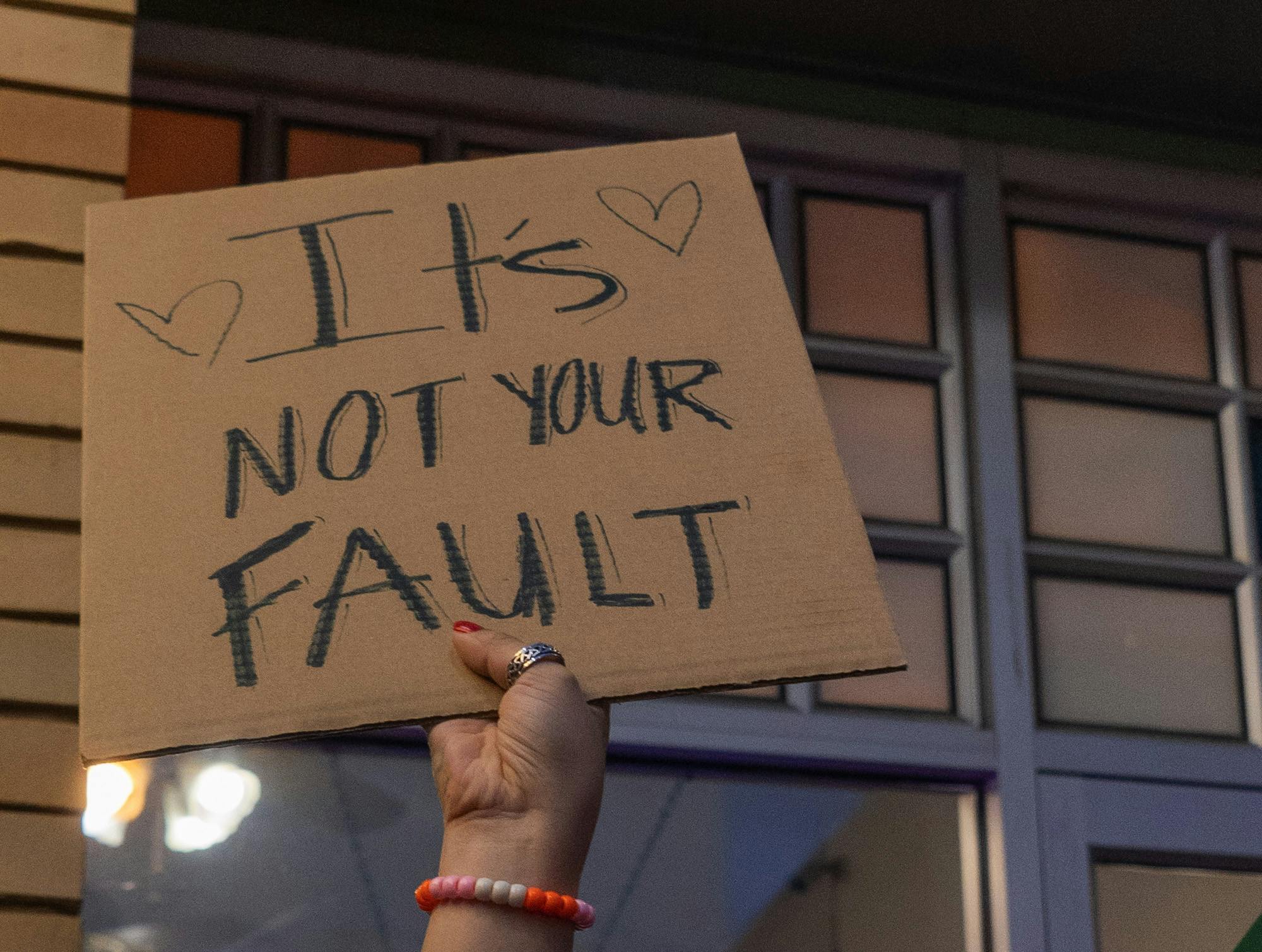Trigger warning: The following content discusses sexual violence.
Take Back the Night, an annual event aimed at supporting sexual assault survivors and dismantling the system that perpetrates violence hosted by Ohio University’s Women’s Center, took place at the Athena Theater last night with a large outpour of attendess of both OU students and the Athens community. Not only were all the seats filled, but so was the floor, with people making their own seats in the aisles. The audience was attentive, listening raptly to the keynote speakers as they talked about their own journeys and the general public’s views on sexual assault in the modern era.
While Take Back the Night, or TBTN, is widely held on college campuses the first week of April, students like Mackayla Schrader, a freshman studying classical civilizations, find that it can be domestic and personalized.
“It feels very comforting to have this amount of people come together and have the speakers share their story as well,” Shrader said. “It feels like an entire diverse community coming together, and it feels more personal than the global movements which you see on the news or anything, but being part of something feels like it's closer to home.”
TBTN taking place on campus calls attention to sexual assault and domestic violence that occurs. It encourages people to march for themselves, for others they may know or just in the name of allyship. The event wants to get out the message that those who may have experience with such things have a support network nearby and accessible.

Zoe Vour, a fifth year studying in child and family studies, feels this acutely as a survivor herself. It’s important to her to, as the message goes, take back the night and the streets for herself. She wanted to walk on TBTN for every survivor that can’t.
“To be able to walk down Court Street and know that I will be safe with a group of people, and reclaim my journey is really important to me,” Vour said.
Taylor Ebert, a graduate student studying social work and a graduate assistant for the Survivor Advocacy Program, encourages this outlook. It’s important to her to show survivors that they are not alone and that the event shows visually the amount of people willing to support them.
“I think it's definitely significant to give survivors their power back because a lot of people aren't able to share their story, or are not able to, or don't have a place to just openly share.” Ebert said. “This is a really empowering event for people to take back the night, as silly as it sounds, and get their voice out there.”
And voices were definitely heard. Shouting chants through a megaphone, leaders encouraged a call and response with the marchers. Some people preferred holding signs with similar messages. Instead of the typical silence and eeriness that might come from walking the streets alone at night, voices echoed in peaceful unison how the night and the street were now theirs and how they want to advocate for change, so that nights of amity like this could become the norm.
An event such as this is meant to not only support survivors but also to raise awareness of how prevalent sexual assault can be. Ebert, as an advocate, is always trying to educate people on these types of statistics.
“I think it's really realizing how much interpersonal violence impacts people everywhere and especially on this campus,” Ebert said.
Monica Paschke, a freshman studying health services administration, agrees on the lack of frequency that talking about sexual assault and violence gets.

“It’s very important, and it’s not talked about enough,” Paschke said. “It’s really prevalent on college campuses.”
TBTN, in association with services like My Sister’s Place, the Survivor Awareness Program and counseling services, seek to acknowledge the bad and uplift the good. Sexual assault cases are common, and they want to decrease this number. At the same time, they are elevating survivor voices and giving survivors a place to go if they need help.
Shrader, a member of the campus organization victims rights ambassadors which helps survivors within the legal system, knows that her participation in such a group has long-reaching effects within her own life and many others.
“I want to walk away with a sense of community, with this sense of understanding the support systems that Ohio University and the Athens community has to offer, and a closer connection to the people around me who also support this idea,” Shrader said.




